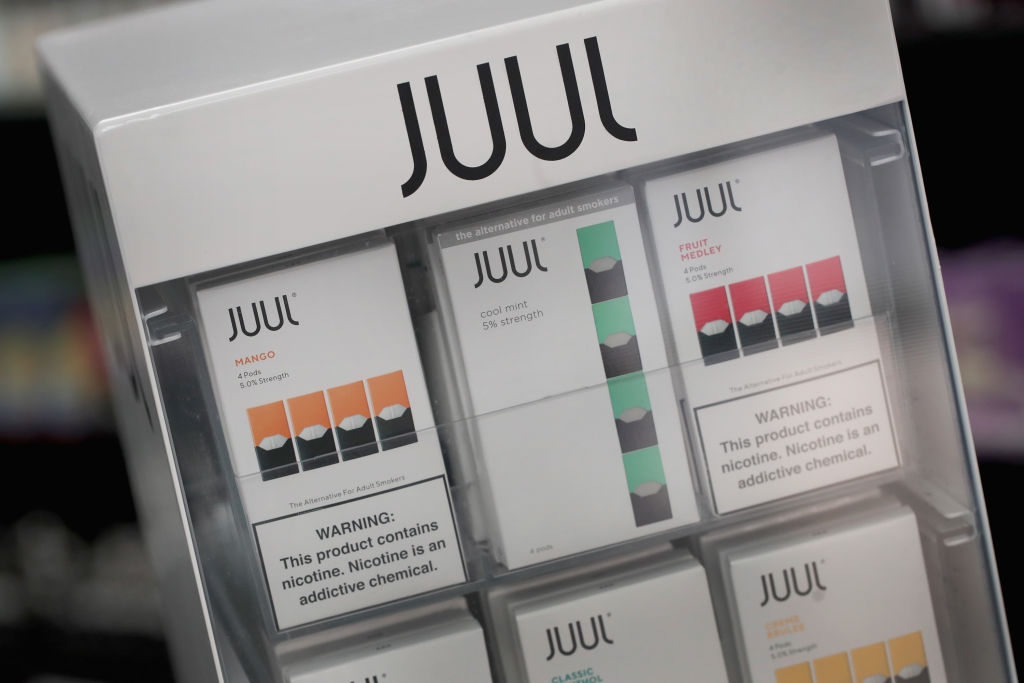
Although San Francisco is home to America’s most popular e-cigarette brand, city officials are signaling that they want nothing to do with Juul.
The city voted Tuesday to ban sales of e-cigarettes, making it illegal to sell nicotine vaporizer products in stores or for online retailers to ship the goods to San Francisco addresses. The ban will be the first of its kind to go into effect in the U.S.
The ordinance will now go to the mayor to sign into law. Cigarettes and other tobacco products will remain legal in the city, along with recreational marijuana.
As cigarette use in the U.S. declines, tobacco companies have looked to other areas for revenue growth. Altria Group Inc., which sells Marlboro cigarettes in the U.S., bought a 35% stake in Juul Labs Inc. last year, valuing the startup at $38 billion. Juul told investors last month that revenue rose to $528 million in the first quarter, as international sales took off. This week, an Indonesian retail chain that sells iPhones said it expected to begin carrying Juul products, sending its stock surging.
The legislation in San Francisco is aimed at all e-cigarette companies, but it has to feel personal for Juul. The San Francisco-based startup is the biggest target for vaping critics, who say it’s hooking kids on nicotine and creating a new generation of addicts.
Juul said it’s committed to stopping people under 21 from buying or using its products, but it wants to keep its vaporizers available to adult smokers looking for an alternative to cigarettes. “The prohibition of vapor products for all adults in San Francisco will not effectively address underage use and will leave cigarettes on shelves as the only choice for adult smokers,” Ted Kwong, a spokesman for Juul, wrote in an email.
After Tuesday’s vote, Mayor London Breed has 10 days to review the legislation. If she signs it, the ban will take effect seven months later, when Juul and similar products will have to be removed from store shelves.
Juul has a backup plan: Put the issue in front of voters. The company said it has collected the required number of signatures to add a measure to the November ballot that would keep e-cigarettes available for purchase in the city to adults over 21. Juul is the major financier behind the Coalition for Reasonable Vaping Regulation, which has been collecting signatures.
On Tuesday, city supervisors also passed an ordinance blocking the sale, manufacture and distribution of e-cigarettes on city property. Juul currently leases office space from the city on Pier 70, but because the ordinance doesn’t apply retroactively, Juul will be able to stay in its space. Even so, Juul has a backup plan for this, too: Last week, the company said it bought a 29-floor office tower at 123 Mission Street and plans to start adding employees there in the next year.
City Attorney Dennis Herrera co-sponsored the sales ban with a city supervisor because, he said, the U.S. Food and Drug Administration failed to require e-cigarette companies to go through a pre-market approval process before they were allowed to sell their products. The FDA began overseeing e-cigarettes in 2016 under the Obama administration. After Donald Trump took office the next year, the agency said it would push back until 2022 a requirement that vape companies submit applications to continue selling their products. Once a product has FDA approval, the legislation would allow its sale in San Francisco again.
“We’ve seen a tremendous increase in use of e-cigarettes, which has led to increased rates of nicotine addiction among young people,” Herrera said. “I don’t think San Francisco is any different from any other city.”
Three weeks ago, Beverly Hills, California, passed the first sweeping prohibition on most tobacco sales, including e-cigarettes, starting in 2021. But a sales ban can’t stop people from heading to nearby cities to get their nicotine fix. That doesn’t worry Herrera.
“This is groundbreaking legislation that shows local governments are prepared to step up,” he said. “What you will see in the aftermath of this legislation is other jurisdictions looking at what they might be prepared to do to protect their young people.”
More Must-Reads from TIME
- Cybersecurity Experts Are Sounding the Alarm on DOGE
- Meet the 2025 Women of the Year
- The Harsh Truth About Disability Inclusion
- Why Do More Young Adults Have Cancer?
- Colman Domingo Leads With Radical Love
- How to Get Better at Doing Things Alone
- Michelle Zauner Stares Down the Darkness
Contact us at letters@time.com